- Home
- Alice Hoffman
Fortune's Daughter: A Novel Page 2
Fortune's Daughter: A Novel Read online
Page 2
It was nearly ten o’clock by the time Jessup started to get dressed. The phone had rung several times, but they hadn’t answered. Jessup didn’t talk to Rae. He pulled on jeans, then went to the oak dresser for a clean shirt. Rae sat up and watched him get ready. Jessup never bothered with a comb; instead he stared into the mirror and shook his head until his dark hair fell into place.
“I’m going to have to make up the time I just missed,” Jessup told her.
He spoke into the mirror as he put on a white shirt. Rae found herself wishing that he would look over his left shoulder—then their eyes would meet and Jessup might see how much she wanted him to stay home with her. If he agreed, she’d be willing to take the whole day off. But that morning the temperature was already at one hundred and two, and the car exhaust on Sunset Boulevard had begun to form a pavilion of clouds, and Jessup simply didn’t have the time to look over his shoulder.
“Don’t bother to wait for me,” he said.
Rae didn’t know why she always had the feeling she’d been the one to force Jessup into something—he had been the one who kept coming to see her. Even on the coldest New England day, when the sidewalk was a sheet of ice, she’d look out her window and there he’d be, waiting. But then, after Rae had managed to get out of the house, he always seemed annoyed to see her. And so, Rae never really knew what it was that brought Jessup out to Newton so often.
That winter, when Rae was sixteen, was the last time Carolyn tried to separate them by force. When she realized who it was out there on the sidewalk nearly every day, Carolyn Perry called the police. After they’d taken him down to the precinct house, Jessup was threatened with charges that made him laugh out loud: loitering. But from where she stood in the driveway, all Rae could see was Jessup being hustled into the rear seat of a patrol car. She was certain they were driving him straight to the penitentiary. She ran upstairs, locked her door, and tried to slit her wrists with a nail file.
Carolyn, of course, gave up. She stopped questioning her daughter each time she left the house, and now whenever she looked out the living-room window and saw Jessup outside, Carolyn simply drew the curtains. Rae was delighted with her own courage, but when she told Jessup about the nail file, he wasn’t impressed.
“You’ll never kill yourself that way,” he told her.
But the nail file had changed one thing—Rae and Carolyn no longer spoke to each other, they didn’t even fight. In the mornings, Rae left for school before her mother came downstairs; at night she sat up in her bedroom on the third floor and waited for Jessup to call. Whatever shred of control Carolyn had had before disappeared. Now Rae did as she pleased, and whenever she wanted money she simply took it. If Carolyn noticed the dollar bills missing from her purse, she never said a word, and the silence between mother and daughter grew deeper and deeper, until finally, even if there had been anything for them to say to each other, it would have been impossible to speak.
Then one day, Rae couldn’t find any change in her mother’s purse and she decided to look through the bureau drawers in her parents’ bedroom. In Carolyn’s sweater drawer, between two wool cardigans, Rae discovered a red leather wallet. She knew she had found something important, but she had never expected so much—fifteen hundred-dollar bills, all folded neatly in half.
Without stopping to think, Rae telephoned Jessup and told him she had to see him. That night she ran all the way to the parking lot of the Star Market.
Jessup was crouched by a brick wall; as soon as he saw Rae he jumped to his feet. It had just begun to snow and the parking lot was deserted; it was the kind of night when you didn’t go outside, unless your life depended on it.
“My mother has money hidden,” Rae told Jessup breathlessly.
“Is that what you got me out here to tell me?” Jessup said. “Look, Rae, everybody’s mother has money hidden. My mother has fifty bucks in a plastic bag in the freezer.”
“No,” Rae said. “I mean a lot of money.”
“Oh, yeah?” Jessup said, almost interested.
“Fifteen hundred dollars,” Rae whispered.
It was so cold in the parking lot that Rae could feel her toes freezing through her wool socks and her boots. But she didn’t dare hurry Jessup; she just watched as he stood there and lit a cigarette and thought about her mother’s money.
“I’ll tell you what we’ll do,” Jessup said finally. “We’ll keep that money in mind.”
Rae didn’t know whether to feel disappointed or relieved—she had half expected Jessup to suggest she go right home and steal the money that night. But even if Carolyn’s bankroll was safe for now, when Rae walked Jessup down to the bus stop, she knew she had betrayed her mother. She told herself it didn’t matter; after all, her mother was her enemy now. And in no time Rae forgot all about the money—although maybe she let herself forget because she knew that Jessup was remembering. And two years later, when Rae was nearly eighteen and they were about to leave Massachusetts together, Jessup reminded her.
“I want you to take that money now,” he whispered.
Jessup’s arm was around her and they were sitting in the dark, on the bleachers behind the high school. Rae found herself wishing that she had never told him about the money in the first place. But when she suggested they didn’t really need it, Jessup took his arm away from her, so quickly you’d think he’d been stung.
“Listen, I’ve had that money in mind all along,” he told her. “If you want us to get a car we need that money.” Jessup had been working at gas stations and construction sites ever since he left high school. “How much money do you think I earn?” he asked Rae now. “If you think I earn enough to buy a car, think again. Your mother doesn’t need that money, Rae. We do.”
Rae swore she would do it. But for days she put it off. If she imagined she was giving her mother some extra time to move the money to a new hiding place, it just didn’t work. When Rae finally went to the bureau to check, she discovered that the wallet was in the same exact place, and there was more cash than before, twenty-two hundred dollars. The night before they planned to leave, Rae telephoned Jessup and told him she couldn’t do it.
“Oh, great,” Jessup said. “Here we go. This is just like when you tried to kill yourself with the nail file. You’ve got to learn if you’re going to do something you’ve got to do it right. Do you think I want to hitchhike down south with some underage minor whose parents can have me put in jail? Think about it,” Jessup told her, “and you’ll soon see the attraction of having a car.”
Rae admitted that she saw the attraction.
“If we leave Boston together we do it right, or not at all,” Jessup said.
Rae could hear him breathing into the receiver. She knew that he had pulled the phone into the hallway so that his mother wouldn’t overhear; he was standing there, waiting for her answer—and waiting was definitely something he did not like to do. There was no doubt in Rae’s mind that, given one good reason, he would leave her behind.
“It’s totally up to you,” Jessup told her.
It was her decision, and she chose a night when the sky was so clear that the stars seemed no farther away than the rooftops. As her parents slept, Rae went into their room, carefully opened the dresser drawer, and took out the leather wallet. After that they were able to do it right, just the way Jessup wanted. They bought the Oldsmobile and drove to Maryland, and they never once went back. But even after seven years, whenever Rae couldn’t sleep she blamed her mother. On those nights, Rae could open every window in the apartment and still feel haunted by the scent of her mother’s Chanel perfume. The odor was everywhere, in the sheets and the curtains, in the dishwater and in every kitchen cabinet. And even though Rae knew it was impossible for Carolyn to have tracked her down after all this time, she found herself searching through the closets and kneeling to peer under the bed—and there were times when she actually believed she might find someone hiding.
The scent of Chanel was particularly strong on that Monday w
hen Rae came in late to work.
“Did you have some woman up here?” she asked Freddy Contina.
“I wish,” Freddy said.
Rae turned the air conditioner to fan and opened some windows. It was somehow much worse to smell that phantom perfume during the day; at night there seemed the possibility of an explanation: the woody scent of the bamboo outside the kitchen window, a neighbor’s cologne filtering through the walls, the terrible power of nightmares.
“Speaking of someone being up here,” Freddy said, “I don’t want Jessup in my office while I’m gone.”
Freddy acquired films in Europe and redubbed them; he was leaving that day for Germany, and whenever he was away Rae invited Jessup up for lunch. Although the last time, when Freddy was in Italy, Jessup didn’t touch his food—he spent the entire hour going through the accounts file, and there wasn’t a thing Rae could do to stop him.
“Never bring your personal life into the office,” Freddy advised.
“What have you got against Jessup?” Rae asked.
The two men had met only once; Jessup had asked so many questions you’d think he was interviewing Freddy for a job.
“He’s the mass-murderer type,” Freddy said.
“What’s that supposed to mean?” Rae asked, offended.
“Or maybe the lone-assassin type,” Freddy reconsidered. “I can just see him up in his room, writing in his diary and polishing his rifle.”
The idea of Jessup’s keeping a diary made Rae laugh.
“You don’t know Jessup,” she said.
“That’s just it,” Freddy said. “I don’t want to know him, and I don’t want him in my office, Rae.”
As soon as the car came for Freddy, Rae telephoned Jessup. She was planning to order up from the deli on the corner and put it on Freddy’s account, but Jessup was out on a job and no one seemed to know when he’d be back. Rae could have ordered something for herself, but she felt the urge to escape from the office. She had found a woman’s turquoise earring on the couch in Freddy’s office, but the scent of Chanel was so unnaturally strong that even if Freddy had spent all night with a woman who had doused herself with perfume the aroma would have been gone by now. And yet there it was, in the filing cabinets and the carpeting, just as if Carolyn was in the office. And so Rae went out, even though the air itself was orange and so thick it seemed as if thousands of butterflies had settled above Hollywood Boulevard.
The minute she left the building, Rae knew she had made a mistake. It was noon, and so hot that the few people there were on the sidewalk seemed stunned. When Rae walked past a jewelry store she found herself staring at a tray of gold chains in the window. In all the years they had been together Jessup had never given her any jewelry, not even a cheap silver chain or a semiprecious stone. All at once, Rae ached for a ruby ring. She nearly walked inside and asked to look at a tray of uncut stones, but suddenly she felt as if she was drowning. On the hot sidewalk, in the middle of a city built out of the desert, she was going under. Maybe it was just that she couldn’t get enough air in her lungs, or that the shadows along the boulevard were deep blue. The edges of things had begun to blur, and had she been submerged in ten feet of murky water it wouldn’t have been any harder to take another step.
This had happened to Rae once before, when she was seventeen and had come down with pneumonia. Even after she was released from the hospital everything looked funny, as if bleach had been added to the air, and a hazy filter hung between Rae and the rest of the world. Jessup telephoned her every night, but after he’d called, he hadn’t had much to say. They stayed on the phone for hours, in silence, as if the only way for them to communicate was by telepathy. But once, Jessup had actually said that he missed her.
“What?” Rae had said, certain that she’d misunderstood.
“Are you trying to embarrass me?” Jessup had said. “I said it once, don’t ask me to repeat it.”
There was something about her illness that made Rae fear she would never get well. She could only see white things: the sheets on her bed, the cream-colored walls, the ruffled curtains at her window. Everything else was fading; when she squinted, she couldn’t make out the titles of the books on the shelf.
“I think I may be dying,” Rae told Jessup one night when he called. She could practically hear him smirking. “I mean it,” Rae said. “I think I may be going blind.”
“I’ll tell you what your problem is,” Jessup said. “I’m not there, and the only thing worth seeing is me.”
A few days later a dozen roses arrived. Carolyn considered throwing them out; even though there was no card, she knew who they were from. But she made the mistake of opening the cardboard box, and once she saw the roses she couldn’t bring herself to put them in the trash. Instead, she filled a tall glass vase with water and carried them upstairs. As soon as she saw the expression on Rae’s face when those flowers were brought in, Carolyn knew that she had lost her daughter.
All that week Rae watched the roses, and as they turned from scarlet to a deep, mysterious purple, she felt her vision returning. But when she was allowed to go out again, and she shyly thanked Jessup for the flowers, he acted as if he didn’t know what she was talking about. By then, the roses had withered and Carolyn had tossed them into the trash, and Rae was left wondering if she had imagined the glass vase on her night table. After all, she had imagined other things when her fever was at its highest: a plane that was circling above the ceiling turned out to be just a buzz in her head; a green lion that sat by her clothes closet was only a sweater that had fallen onto the floor. It was possible that there had never even been flowers in her room, and once she was well again, roses really seemed too trivial a thing for Jessup to send.
Even though she had no fever now, Rae couldn’t continue on to Musso Frank’s, where she’d planned to put her lunch on Freddy’s tab. The sidewalk was like quicksand, the next corner seemed miles away. Rae ducked into the closest doorway, the entrance to a place called The Salad Connection. When she leaned against the plate-glass window she could feel the shudder of an air conditioner’s motor; each time a customer walked through the door a rush of cold air escaped, then was swallowed by the heat of the boulevard. Quickly, Rae began to count. She hoped that by the time she reached one hundred, she’d feel strong enough to walk back to the office and lie down in the dark. But she hadn’t even gotten to thirty when she noticed a sign offering free psychic readings every Wednesday and Friday. And that was when Rae stopped counting.
Ten years earlier, when Rae and her mother were engaged in the worst of their fighting about Jessup, they had gone to a tearoom near the Copley Plaza Hotel to have their fortunes read. They’d been arguing about the curfew Rae always ignored, when Carolyn had thrown up her hands, turned, and walked into the tearoom. Rae had followed and they waited, side by side and in silence, until the fortune-teller signaled them to a table. The fortune-teller was hidden beneath fringed shawls and thick rouge; she offered them poppyseed cakes and mint tea, then proceeded with a reading that was dead wrong. To Carolyn, who had a real distaste for boats, she promised a sea voyage. For Rae, a miserable student, there was a scholar’s future. Rae and her mother had looked at each other across the table; in spite of themselves, they smiled. Clearly, this fortune-teller would tell them whatever she imagined they wanted to hear. Of course Rae asked about Jessup. “What about my boyfriend? Will we stay together?”
“Oh, yes,” the fortune-teller had said, and for a moment Rae saw her mother draw back. “Your boyfriend,” the fortuneteller had gone on, “is tall and handsome and extremely shy. Polite, wonderful with children, could become a doctor or a lawyer—an all-around darling boy.”
That misreading had made Rae and Carolyn so giddy that they’d fallen out the door of the tearoom and into each other’s arms. Afterward it was a joke between them: when things seemed dark there was always a place near the Copley Plaza Hotel where it was possible to hear good news for only five dollars.
Good news wa
s exactly what Rae wanted to hear right now, so she went to The Salad Connection, past a buffet table offering only the coolest food—lettuce leaves, cucumber, slices of avocado. Sitting in a leatherette booth, she ordered lunch and decided to skip dessert—if Jessup was thinking about gaining weight, she might as well think about it too. After she’d finished her salad, the waitress brought an empty cup and a pot of Darjeeling tea. There was a white business card on the edge of the saucer:
LILA GREY
47 Three Sisters Street
Readings and Advice—Limited Private Consultations
25 dollars per hour
Good news, Rae saw, had gotten more expensive.
After scanning the room for the fortune-teller, Rae realized that the psychic was at the next table. She had expected something more than a few silver bangle bracelets and a small silk turban. The psychic appeared to be in her forties, with thick gray hair cut on an angle at her jawline, so that when she leaned over to peer into a teacup no client could see her expression or her eyes. But across the aisle separating them Rae could see the psychic’s hands resting on a tabletop, and the long, delicate fingers made Rae uneasy. A woman who picked up a teacup so cautiously might actually be searching for more than good news.
By the time the psychic sat down across from Rae it was nearly one o’clock, and Rae had the sense that if she weren’t careful she might just believe anything she was told. Out on Hollywood Boulevard it was now so hot that the asphalt melted. Whenever people crossed the street their shoes got coated with tar, and the smell of tar made them remember summers in whatever town they grew up in, and they found themselves yearning for lemonade, just as they had on hot days back home when the air hung above them and clouds had the burning, sooty edge of August. Inside the restaurant the air conditioner was turned up higher, and as the psychic raised her arm to pour the tea, Rae felt an odd chill along the backs of her legs.

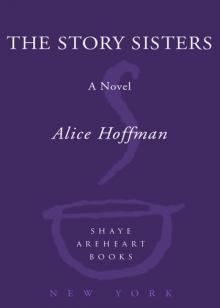 The Story Sisters
The Story Sisters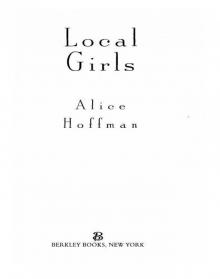 Local Girls
Local Girls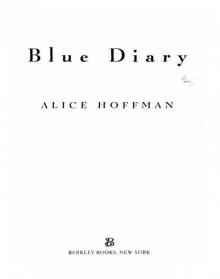 Blue Diary
Blue Diary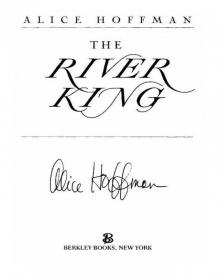 The River King
The River King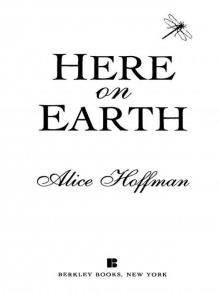 Here on Earth
Here on Earth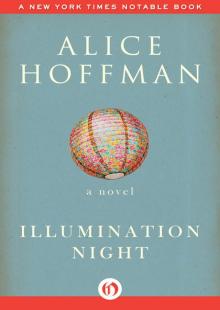 Illumination Night: A Novel
Illumination Night: A Novel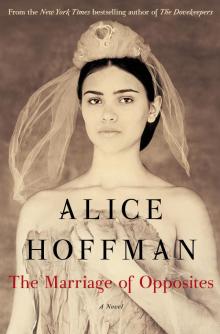 The Marriage of Opposites
The Marriage of Opposites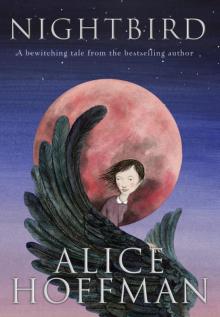 Nightbird
Nightbird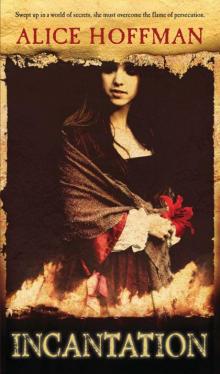 Incantation
Incantation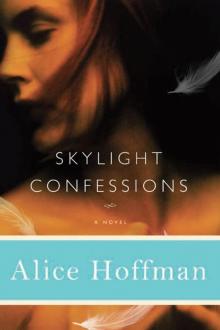 Skylight Confessions
Skylight Confessions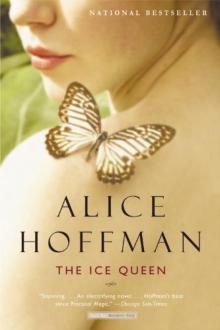 The Ice Queen
The Ice Queen Second Nature
Second Nature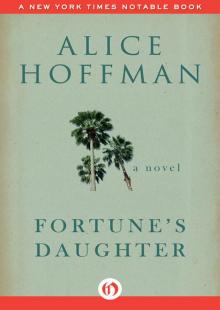 Fortune's Daughter: A Novel
Fortune's Daughter: A Novel Seventh Heaven
Seventh Heaven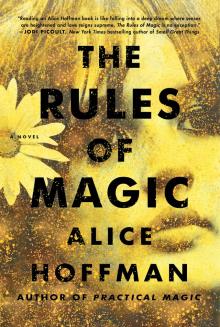 The Rules of Magic
The Rules of Magic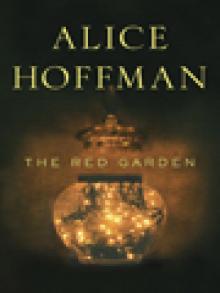 The Red Garden
The Red Garden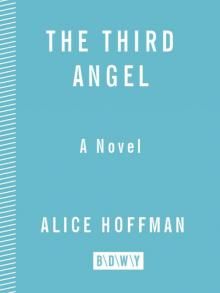 The Third Angel
The Third Angel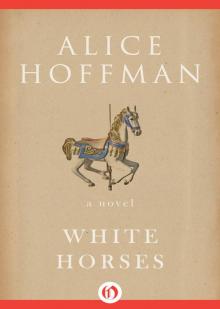 White Horses
White Horses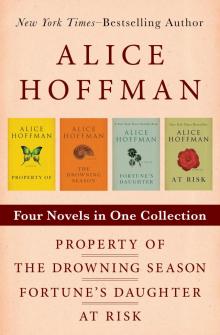 Property of / the Drowning Season / Fortune's Daughter / at Risk
Property of / the Drowning Season / Fortune's Daughter / at Risk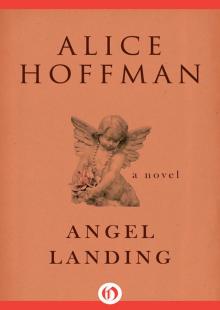 Angel Landing
Angel Landing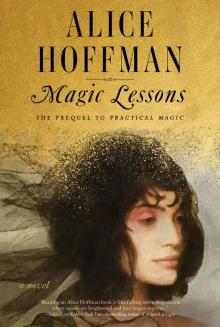 Magic Lessons
Magic Lessons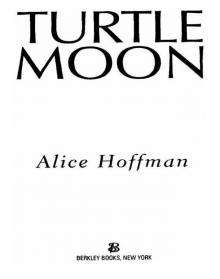 Turtle Moon
Turtle Moon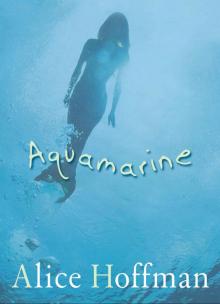 Aquamarine
Aquamarine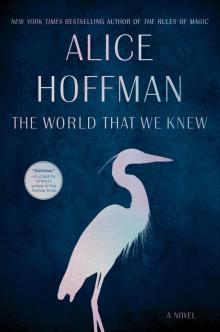 The World That We Knew
The World That We Knew Faithful
Faithful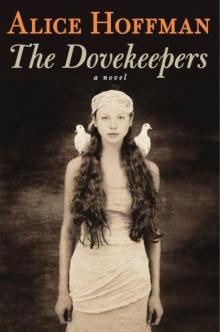 The Dovekeepers
The Dovekeepers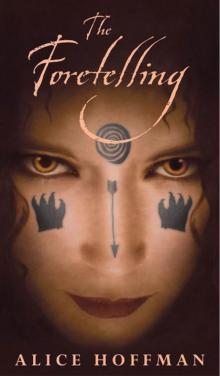 The Foretelling
The Foretelling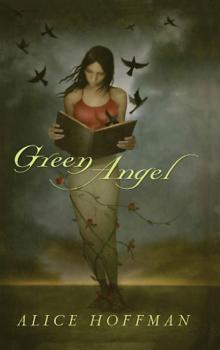 Green Angel
Green Angel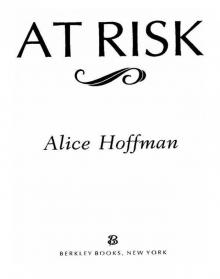 At Risk
At Risk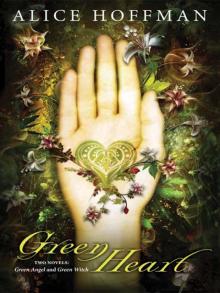 Green Heart
Green Heart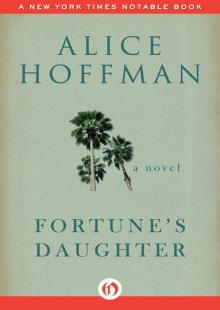 Fortune's Daughter
Fortune's Daughter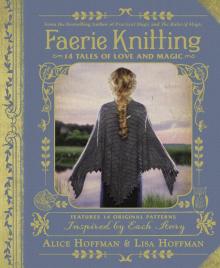 Faerie Knitting
Faerie Knitting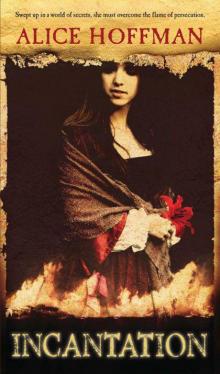 Incantation (v5)
Incantation (v5)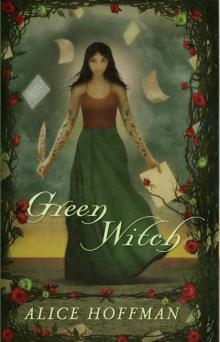 Green Witch
Green Witch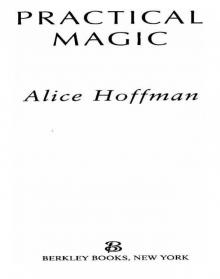 Practical Magic
Practical Magic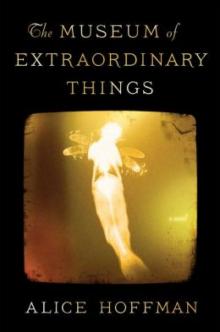 The Museum of Extraordinary Things
The Museum of Extraordinary Things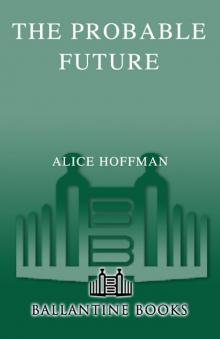 The Probable Future
The Probable Future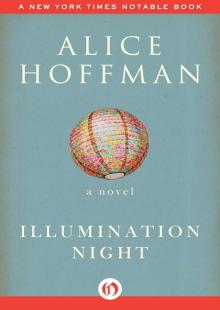 Illumination Night
Illumination Night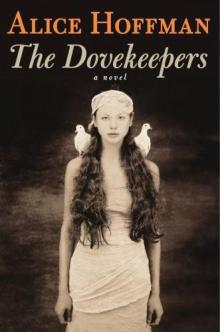 The Dovekeepers: A Novel
The Dovekeepers: A Novel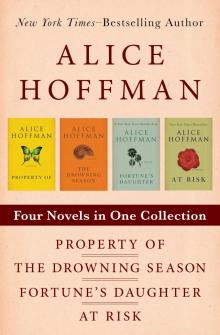 Property Of, the Drowning Season, Fortune's Daughter, and At Risk
Property Of, the Drowning Season, Fortune's Daughter, and At Risk